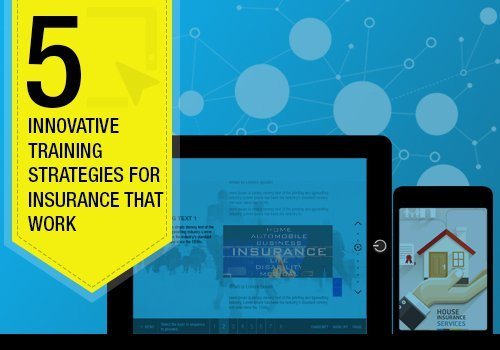eLearning For The Insurance Industry: Industry-Specific eLearning Spells Success For Employees As Well As Companies
The Banking and Financial sector was one of the first adopters of technology-based learning. To begin with, most of the trainings developed were aligned to internal needs within the organization. This is not as true today, as eLearning goes above and beyond the strict confines of formal workplace learning. Instead of highly structured information heavy courses, eLearning now provides a variety of choices including informal, collaborative, or peer learning – within the organization and to its extended partners as well. Using eLearning for the insurance industry helps employees keep at par with changing norms and regulations, new products, processes in the market, as well as regular mandatory compliance trainings.
There are different trainings that can be created for different learning needs within the organization:
1. Product Training.
- New recruits can be trained on the portfolio of products and get up to speed quickly with these training.
- Existing employees can be trained on new markets, products, and services so that they can be updated on development within and beyond the organization.
2. HR And Soft Skills Training.
- Selling is a huge part of the insurance industry and there is a continuous process of interaction between employees and prospective clients. They can be trained continually with eLearning interventions.
- Evaluation can also be conducted on a regular basis to ascertain pertinent training needs.
3. Compliance And Certification.
- Complying with regulatory requirements is critical for all employees working in the sector. eLearning can provide continuous training support here.
- eLearning platforms can also manage training schedule and send reminders of upcoming training events to make sure that employees are not behind their mandatory learning requirements.
Using eLearning For The Insurance Industry: Our Case Study
Our client in the industry is one of the leading insurance providers in India, with an extensive array of products for diverse customer needs. Amidst the competitive environment of the insurance industry, they have made their mark with customer-centric products and a dedicated approach to customer service.
- They had developed a series of products targeted for rural market and wanted to train its sales team on the whole portfolio of products.
- Products included solutions ranging from low-cost insurance policies that would cover the entire family to education policies for children and comprehensive fixed-term plans for savings as well as insurance-cover.
- Keeping the needs of niche-market in mind, training module needed to be developed in 8 regional languages of India.
- The client also wanted utilization of the module to extend to self learning as well as team learning, where supervisors could assimilate knowledge and then further train their respective teams.
- Our client was also keen to explore the utilization of the training module as a marketing tool to reach out to their customers.
Keeping in mind the fiercely competitive nature of insurance industry, development time available for creating training module was only two months. Though this was a very small window, it was also crucial for the client to reach out to their customers within this time frame in order to get early-entrant advantage and ward off competitors with similar products. Another challenge was diverse audience profile – different in culture and background. They needed to be trained in their regional languages and the training module needed to have a universal appeal that would bridge barriers of diverse backgrounds and spread-out geographies.
- To begin with, our development team created a course in one regional language and approved it with the client. In-house language experts were then employed to re-create the approved course in rest of the languages. In this manner, our team developed training module for 6 products, each in eight different languages.
- On-site teams were deployed to closely liaison with the client and smoothen out time-management issues.
- The course was built with XML codes, to make room for content-updates and changes from time to time. The client’s IT team was apprised on the process of making changes and updating the module.
- 2D Human figures were introduced in the course who shared information about the company, its background and history, products, and their benefits. The element of conversation was prominent through a series of questions and answers that infused the course with human warmth.
- Audio supported on-screen text and transcripts were made available for in-depth study.
- Graphical background was developed keeping rural background in mind, so that customers could find necessary connect with the content.
- In addition, a separate version of the module was developed to cater to marketing needs. Length of the course was cut down from 30 minutes to five minutes. Audio-voiceovers were changed and animations were introduced to create interest in the mind of customer.
With the dissemination of training module, the client derived several benefits from the solution.
- Multiple courses in different languages were able to cater to the needs of specific markets all across India.
- Provisions for change enabled prolonged use of the module for training purposes.
- Two distinct versions of the module were able to address two distinct needs – training and marketing. With some changes in text and audio, the same course was able to deliver training to the sales team and impart knowledge to prospective customers as well.
- On the whole, the solution saved the client considerable time and moneys through a cheaper mode of delivery, provisions for extended use over a period of time and for distinct organizational purposes.
- Due to strict diligence of time-schedule, the client could impart training to their sales team effectively and continuously.
eLearning is suitable for different industries in different ways; it is best to ascertain the needs of the industry and create eCourses accordingly to ensure learning success.









